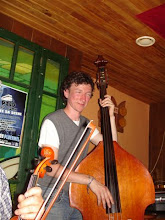Welcome again to this blog. Thank you so much, first of all, for having completed my short survey. I created this post so you can leave comments/feedback/advice about some of the questions, the video, and the research in general. I will do my best to answer them in due time (you can contact me for a copy of the dissertation in May).
the link to the survey is the following (! it is only aiming at London Hungarians !):
http://calamma.net/questionnaire/hungarianmusic/
As I mentioned in the email I do favor face-to-face encounters the most, so feel free to contact me. And it would be a great help if you could forward this survey to your Hungarian contacts in the capital...
If you are interested in more examples of contemporary Hungarian bands, here is a short list of youtube videos to view:
Csík Zenekar:
- "most múlik pontosan" (by Quimby):
http://uk.youtube.com/watch?v=D6RaU9n4ZuI
Pálinká band from London:
- see website here
http://uk.youtube.com/watch?v=4dq2ttPPlX8
Balázs Elemér Group
- "Szeretöm e táncba"
http://www.youtube.com/watch?v=CDtDDCzM1Wg&feature=related
- "kinek van kinek nincs"
http://www.youtube.com/watch?v=SHny23LrGqs&NR=1
- "végig mentem a lonai nagy utcán"
http://www.youtube.com/watch?v=Etb-tpNt49U&NR=1
Pálya Beáta in Gatlif's "Transylvania":
http://www.youtube.com/watch?v=LrzlVrglDx4&feature=related
and live:
http://www.youtube.com/watch?v=fhJfoPTGSig&feature=related
A link to the website of documentary "Életek Éneke":
http://www.eletekeneke.hu/hu/index.html
An interview of "Folk/Hip-hop" duo Suhancos on Hír TV:
http://www.youtube.com/watch?v=dJo_XyZ4gk0&feature=related
The Tourist Lángos
5 weeks ago





